Messerschmitt Me 262 jet fighter
The Messerschmitt ME-262A- I a Schwalbe (Swallow) was the first operational single seat land-based jet engine interceptor fighter. It had four 30 mm Rheimnetall-Borsig MK108 cannons in its nose, two with 100 rounds each, two with 80 rounds each. It could also carry 24 R4M 55 mm unguided rockets on underwing racks The Messerschmitt ME-262A-2a Sturinvogel (Storm bird) was the first single-seat land-based jet engine fighter bomber. It had four 30 mm RheinmetallBorsig MK108 cannons in its nose, two with 100 rounds each, two with 80 rounds each. It could also carry 24 R4M 55 mm unguided rockets on underwing racks and two 250 kg (551 lb) bombs on racks under nose
The Messerschmitt ME-262B-1a/U1 was the first operational two seater night jet engine fighter. It had four 30 mm Rheinmetall-Borsig MK1 08 cannons in its nose, two with 100 rounds each, two with 80 rounds each. It could also carry 24 R4M 55 mm unguided rockets on underwing racks
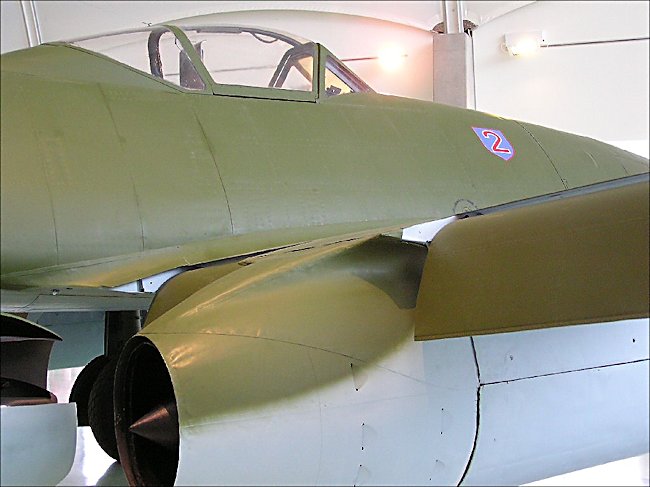
Photograph taken at the RAF Museum, Hendon, London NW9 5LL England
The Messerschmitt ME-262B-2a was a two seater night fighter. It had four 30 mm Rheinmetall-Borsig MK108 cannons in its nose, two with 100 rounds each, two with 80 rounds each. It could also carry 24 R4M 55 mm unguided rockets on underwing racks and two inclined MK 108 cannons behind the cockpit
The German Luftwaffe was the first airforce to fly jet fighters operationally. They were designed by Messerschmitt AG. The prototype first flew on 18 h July 1942. The Messerschmitt Me 262 became the first jet airplane used in combat when it attacked a British photo-reconnaissance Mosquito flying over Munich on 25 h July 1944. The Me 262 was much faster than any Allied Aircraft at that time, and it was powerfully armed with bombs and cannons.
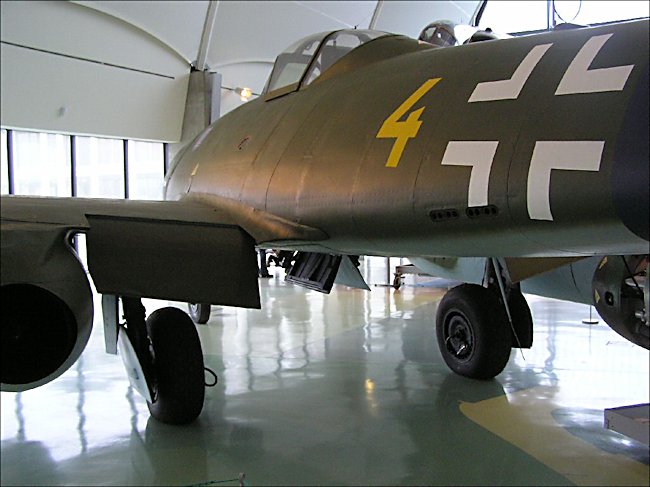
Photograph taken at the RAF Museum, Hendon, London NW9 5LL England
There were problems with this new warbird. Its new jet engines were unreliable and they only had a service life of 25 hours. It had poor acceleration at low speeds making it vulnerable and there were too few aircraft to make a vital difference. Most of the seasoned veteran pilots of the Spanish Civil war and the battle of Britain and the Eastern Front had been killed or captured. Most of the German pilots of 1944 were of poor quality with limited experience.
The Jumo Jet engines had a tendency to flame out if the throttle was advanced too quickly. This made it perform sluggishly during take-offs and landings. The RAF Spitfire and USAAF P51 Mustang Pilots quickly discovered this weakness and changed tactics to attack the new ME-262 jets when they tried to land. Another weakness of the ME262 jet fighter was that the Allied P51 Mustangs and Spitfires were also much more maneuverable. Allied pilots developed a tactic of waiting until a Messerschmitt Me-262 jet was committed to a dive during the pursuit of its target and then they would perform a high-G turn to avoid the faster Me-262
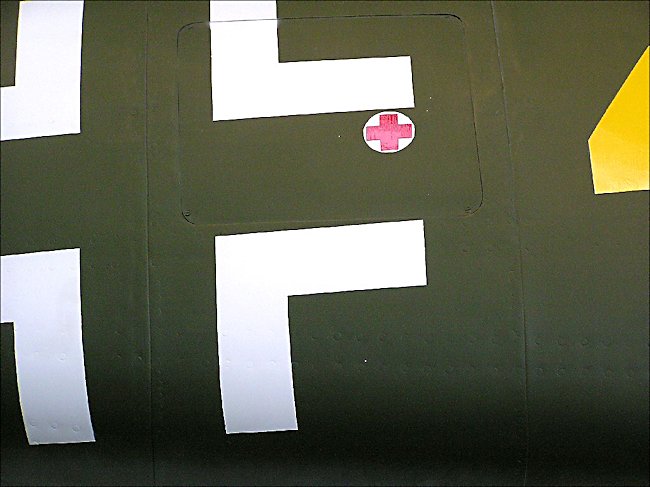
Photograph taken at the RAF Museum, Hendon, London NW9 5LL England
Senior officers in the Luftwaffe leadership were cautious about authorizing full production of this new technology and Allied bombing also contributed to delays in the Messerschmitt Me262 entering operational service. Adolf Hitler insisted that the Me 262 be configured as a bomber rather than a fighter before he agreed to authorize the Me 262 into mass production. Generalleutnant Adolf Galland, Goring and Messerschmitt all believed that it should have been a Fighter first but Hitler would not listen. They went behind his back and built the Messerschmitt Me262 as a fighter but when the Fuhrer discovered the true facts he immediate ordered that all Messerschmitt Me262 fleet be retrofitted as Fighter Bombers so they could carry two bombs This delayed their availability to repelling the punishing Allied bombing raids.
Hitler was frightened that this new technology would fall into the hands of the allies. He decried that it remain above 13,000 ft to make it less liable to low altitude ground fire. Even though Germany was continually being bombed they still managed to produce the Messerschmitt Me-262 jet in large numbers. 1,200 were delivered to Luftwaffe squadrons but a high percentage of them were blown up on the ground by enemy action as they waited for fuel, pilots or spare parts. It never reached its full potential. If all 1,200 jet fighters had been available to deal with the Allied bombing assaults then the war may have lasted longer. An incident to back up this claim happened in September 1944. Six Messerschmitt Me262 destroyed fifteen American four engined bombers in 15 minutes, Generals Spaatz and Eisenhower reported that these amount of losses could become unbearable. A number of the Me 262 jets were also captured by advancing Allied ground troops. Fewer than 300 Me262's saw combat.
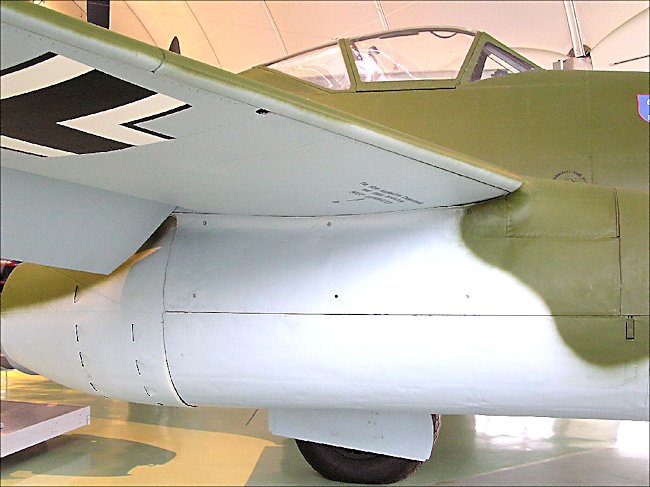
Photograph taken at the RAF Museum, Hendon, London NW9 5LL England
As a bomber it was limited by it's payload of two 500 Ibs bombs but some of the Messerschmitt 262 jets were fitted with new lethal fragmentation "poof" bomb that were used against Allied Airbases with great effect. They were programmed to explode at about 1,000 feet above ground level. They emitted a loud "poof" 'noise as 69 tennis ball sized bombs were shot in every direction. In seven seconds they would hit the ground and spewed fragments of hot metal against parked aircraft, vehicles, pilots, ground staff and buildings. The ground crews had to dig trenches near the aircraft so they could duck into them when the "poof" ' bombing raids occurred. Allied losses from these new fragmentation bombs and from aircraft taxing into the new trenches started to become so serious that some airfields were relocated further to the rear of the front line.
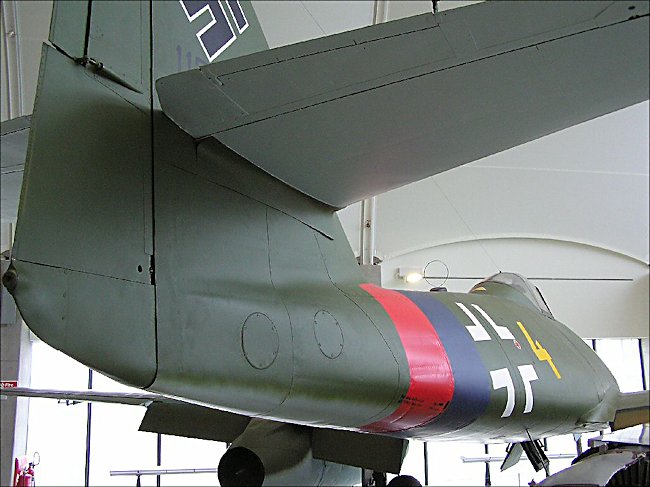
Photograph taken at the RAF Museum, Hendon, London NW9 5LL England
Messerschmitt Me 262 books


Tweet